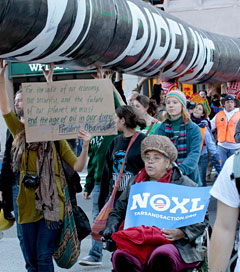The State Department's inspector general will investigate potential conflicts of interest within the Department's approval process for TransCanada's Keystone XL pipeline that would pump oil from the Alberta tar sands in Canada to the Gulf Coast, according to a letter released on Monday.
The investigation could delay the White House's final decision on the project, which is currently due by the end of the year.
Environmental groups and 14 members of Congress recently requested an investigation into potential conflicts of interest such as TransCanada's successful recommendation that Cardno Entrix, a massive contracting firm and major client of TransCanada, conduct much of the federally mandated environmental review of the pipeline project.
Thousands of protesters encircled the White House on Sunday and marched through downtown Washington to demand that President Obama cancel the project. Many of the protesters were Obama supporters who are holding him to his campaign promise to move the country away from its dependence on oil.
Obama has suggested that he would have the final say on the project and is facing mounting pressure from Canadian authorities to approve the pipeline, while young activists and environmentalists who represent crucial segments of his voter base are demanding his administration reject the project.
The proposed $7 billion pipeline would run mostly underground for nearly 1,700 miles and pump 830,000 barrels of tar sands oil a day.
Proponents say the project will create jobs and decrease America's dependence on oil from unfriendly countries, but environmentalists say extracting the extra-heavy tar sands oil is an environmentally devastating process and the pipeline would threaten farmland, wildlife areas and underground domestic water supplies.
A recent Cornell Global Labor Institute report found that TransCanada's claim that the project would create 20,000 jobs is “unsubstantiated.”
The project has also angered ranchers and farmers in states like Nebraska, where TransCanada has allegedly threatened landowners with imminent domain. Lawmakers in Nebraska called a special session on the pipeline last week and recently introduced five bills to regulate the pipeline, including a bill that would give a special panel and the governor authority over imminent domain claims.
The Environmental Protection Agency (EPA) normally prepares Environmental Impact Statements (EIS) for interstate projects, but because the pipeline crosses an international border, the State Department prepared the EIS for the Keystone XL project. The department worked closely with Cardno Entrix.
In July, top EPA officials expressed concern over deficiencies in the draft EIS. The State Department released a final EIS in August with a favorable review of the project. The public comment period on the EIS ends later this month, but recent reports show that thousands of public comments may have disappeared.
Join us in defending the truth before it’s too late
The future of independent journalism is uncertain, and the consequences of losing it are too grave to ignore. To ensure Truthout remains safe, strong, and free, we need to raise $46,000 in the next 7 days. Every dollar raised goes directly toward the costs of producing news you can trust.
Please give what you can — because by supporting us with a tax-deductible donation, you’re not just preserving a source of news, you’re helping to safeguard what’s left of our democracy.
